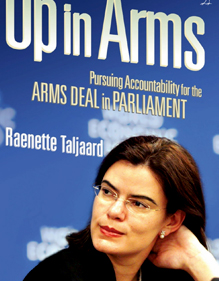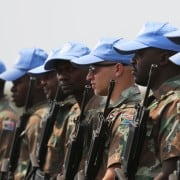|
Getting your Trinity Audio player ready...
|
 By Lee-Ann Alfreds
By Lee-Ann Alfreds
Raenette Taljaard is one of democracy's champions – a World Economic Forum young global leader, a Yale World Fellow, holder of two master's degrees, published author, distinguished academic, one of the youngest women ever to be elected to South Africa’s Parliament, political studies lecturer at Cape Town University, and a knowledgeable critic of the arms deal.
Like the other witnesses scheduled to testify in the second phase of the Arms Procurement Commission, Taljaard is no less passionate about getting to the truth behind South Africa’s controversial 1999 arms deal. But unlike them, she evinces no desire for the deal to be cancelled or for criminal charges to be laid against those who corrupted the process.
Instead former Democratic Alliance (DA) MP Taljaard, the second witness to testify in phase two, merely wants to ensure lessons are learned from the deal so there can be no repeat in future.
“I have expectations around recommendations in the area of policy,” she says of her expectations for the commission, which is probing allegations of corruption and fraud in the multi-billion purchase of submarines, frigates and planes to replenish the South African National Defence Force in 1999. “No commission tends to result in specific policy recommendations. But South Africa will have further defence procurements in future. I think for me the issue is expectations around policy recommendations. There will be a lot of policy recommendations within different departments.”
She explains her “measured” response to the arms deal and the commission – which has been widely criticised by arms critics as a farce – as the result of her being a “constitutional office-bearer”. Taljaard is an Independent Electoral Commission commissioner. “If I was a member of the DA, I would be responding differently,” she concedes.
But while she is less vociferous than the other second-phase witnesses (who include whistleblowers Patricia de Lille and Richard Young and critic Terry Crawford-Browne), Taljaard is ironically one with more intimate knowledge of the deal than many of them.
Access to the most sensitive information
An MP for the DA at the time, Taljaard was a member of the public enterprises portfolio committee who went on a study tour in 2000 to understand the industrial participation programme – or offsets, as they are more commonly known – related to the deal.
Taljaard was also a member of the National Assembly’s standing committee on public accounts (Scopa), which acts as Parliament’s watchdog over the way taxpayers’ money is spent, when it held discussions about how a 2000 multi-agency investigation into corruption allegations relating to the arms deal would be conducted. As a result, Taljaard – whose 2012 book, titled Up in Arms: Pursuing Accountability for the Arms Deal in Parliament, expressed her disenchantment with party politics and the moral meltdown she experienced within Parliament during those years – is one of the few who have read in their entirety the secret Cabinet documents relating to the arms deal, many of which were subsequently classified.
Today, Taljaard admits that no flags were raised for her during the study tour, even though arms critics contend that offsets, which are common in defence deals, have never worked to the advantage of any country buying arms. In South Africa’s case, the government promised that 65 000 jobs and R110-billion in investment would be generated by the arms deal, but only a fraction of that has actually materialised, the commission has heard.
But being part of Scopa when it tried – and failed – to hold the government to account was eye-opening. “I don’t think I realised the extent to which it (the arms deal) would become contested,” Taljaard admits.
She’s also amazed at how long the saga has dragged on – the commission was established in 2011, has had its mandate extended several times and Commissioner Willie Seriti indicated in July that he may apply to have it extended again when its term expires in November. “I never expected that it could be such a protracted process of questions, more answers, questions and more answers,” she says.
However, she points out that while she is neither “optimistic nor pessimistic” about the commission, she believes its work is significant, which is why South Africans should be interested in its proceedings. “I think it’s important to remember that the arms deal has challenged institutions. We must think back to the time (when the arms deal took place) it was the very years of our transformation to democracy. The institutions weren’t as established as they are now. It (the arms deal) was a very significant event … that altered and profoundly affected these institutions.”






